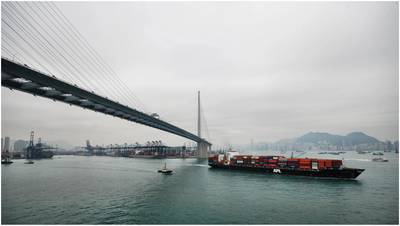New regulation to require oceangoing vessels to switch to clean fuel while at berth
The Government of Hong Kong’s Air Pollution Control (Ocean Going Vessels) (Fuel at Berth) Regulation, which mandates oceangoing vessels (OGV) to use clean fuels while berthing in Hong Kong for reducing emissions so as to improve air quality, will be gazetted Friday, March 13.
The compliant fuels required by the regulation are low-sulphur marine fuel (sulphur content not exceeding 0.5 percent), liquefied natural gas (LNG) and any other fuels approved by the Director of Environmental Protection.
"The regulation prohibits OGVs from using any fuel other than compliant fuel while at berth in Hong Kong, except during the first hour after arrival and the last hour before departure. The shipmasters and ship owners are required to record the date and time of fuel switching and keep the relevant records for three years. If an OGV uses technology that can achieve the same or less emission of sulphur dioxide (SO2) when compared with using low-sulphur marine fuel, the OGV may be exempted from switching to compliant fuel," a spokesman for the Environmental Protection Department said.
When the regulation comes into effect, the master and owner concerned of any OGV using noncompliant fuel while at berth in Hong Kong will be liable to a maximum fine of $200,000 and imprisonment for six months. Shipmasters and ship owners who fail to record or keep the required particulars will also be liable to a maximum fine of $50,000 and imprisonment for three months.
OGVs generally run on heavy fuel oil with an average sulphur content of 2.6 percent. The SO2 emissions of an OGV at berth account for about 40 percent of its total SO2 emission during its stay in Hong Kong. The new Regulation can help reduce the total emissions of SO2 and respirable suspended particulates by 12 percent and 6 percent respectively, which contributes to improving the air quality of Hong Kong and reducing health risks.
The government will table the regulation at the legislative council Wednesday, March 18. If approved, the regulation will take effect July 1, 2015.














